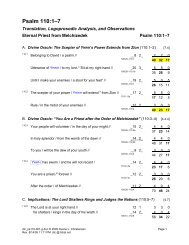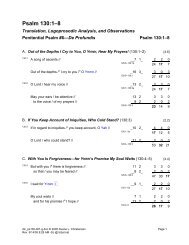Reading Genesis 1-2 in Hebrew - Bibal.Net
Reading Genesis 1-2 in Hebrew - Bibal.Net
Reading Genesis 1-2 in Hebrew - Bibal.Net
You also want an ePaper? Increase the reach of your titles
YUMPU automatically turns print PDFs into web optimized ePapers that Google loves.
<strong>Read<strong>in</strong>g</strong> <strong>Genesis</strong> 1–2 <strong>in</strong> <strong>Hebrew</strong><br />
maqqEp. The verbal form avErOz is the Qal active participle sg. masc. from the root vrz (“sow<br />
seed”). The masc. noun varez (“seed”) reiterates the same verbal root.<br />
��������‘��������π‘����������—transliteration:<br />
'·-Heµr val-P¸-n kol-hA-'Aµ-rec, µ “‘which is on the face of<br />
all the earth.’” The particle of relation reH‹' (“which”) here <strong>in</strong>troduces an extended prepositional<br />
phrase. The preposition ynp-lv (“on the face of”) carries the sense of surface, as it does <strong>in</strong> 1:2.<br />
����������������„<br />
��‘�������û�‘�������ô����‘��ƒ‘�����—transliteration:<br />
w¸-'et-Kol-hA-vEµc '·-Her-BÙµ p¸-rÓ-vEµc<br />
zO-rEµ-av zAµ-rav, “‘and every tree that has fruit yield<strong>in</strong>g seed.’” The def<strong>in</strong>ite direct object marker<br />
here <strong>in</strong>dicates a further aspect of what Elohim has given the human. In the masc. noun EvAh<br />
(“the tree”) the vowel under the def<strong>in</strong>ite article is lengthened to compensate for the fact that the<br />
follow<strong>in</strong>g guttural cannot be lengthened. The fruit of the tree (Ev-yirÕp) <strong>in</strong> turn yields seed<br />
(var√z avErOz). Note the lengthen<strong>in</strong>g of the vowel <strong>in</strong> the segholate noun, which is pausal (caused by<br />
the presence of the accent 'atnAx).<br />
�������������„ ���������û����—transliteration:<br />
lA-keµm yih-yeµh l¸-'ok-l‰µ, “‘to you they shall be for eat<strong>in</strong>g.’”<br />
The position of the preposition l (“to”), which has the 2 nd pl. masc pronom<strong>in</strong>al suffix, suggests<br />
emphasis. The verb is Qal imperfect 3 rd sg. masc. from the root h√yAh (“be[come]”). The<br />
preposition l (“to, for”) is prefixed to the fem. noun hAl¯kA' (“eat<strong>in</strong>g, food”). The accent on the<br />
penult here is the short vowel o (qAmAc xAX˚p) <strong>in</strong> a closed unaccented syllable whereas the<br />
vowel under the ultima is the long vowel A (qAmAc).<br />
�������������•œ��‘���������1:30�<br />
���������‘�������������������������������������‘�����������<br />
�����‘������•�����������������„<br />
������û��‘��ƒ‘�������œ������������‘����������<br />
������������•œ��‘��������—transliteration:<br />
˚-l¸-kol-xay-yaµt hA-'Aµ-rec, “‘and for every liv<strong>in</strong>g creature of the<br />
earth.’” Before shewa the vowel of the wau-conjunction becomes ˚. The first noun here is the<br />
construct form h√Cyax (“animal, liv<strong>in</strong>g be<strong>in</strong>g”) with shorten<strong>in</strong>g of the vowel <strong>in</strong> the f<strong>in</strong>al syllable. Note<br />
the compensatory lengthen<strong>in</strong>g of the vowel under the def<strong>in</strong>ite article <strong>in</strong> the word erA'Ah (“the<br />
earth”) because the ' cannot be doubled.<br />
��������‘�������������������������������������‘������—transliteration:<br />
˚-l¸-kol-vÙµp haH-HA-maµ-yim<br />
˚-l¸-kOµl rÙ-mEµW val-hA-'aµ-rec, “‘and for every bird of the sky and for all that crawls on the earth.’”<br />
On the mean<strong>in</strong>g of the words here, compare 1:28. The Qal active participle sg. masc WEmÙr from<br />
the root Wmr (“creep, crawl”) should be compared with the fem. form teWemOr, which is written<br />
defectively <strong>in</strong> 1:28<br />
��������‘������<br />
��π‘����������—transliteration: '·-Heµr val-P¸-n kol-hA-'Aµ-rec, µ “‘which is on the face of<br />
the earth.’” See 1:29 above.<br />
© 2005 BIBAL Corporation, All Rights Reserved Version 1.0<br />
20





